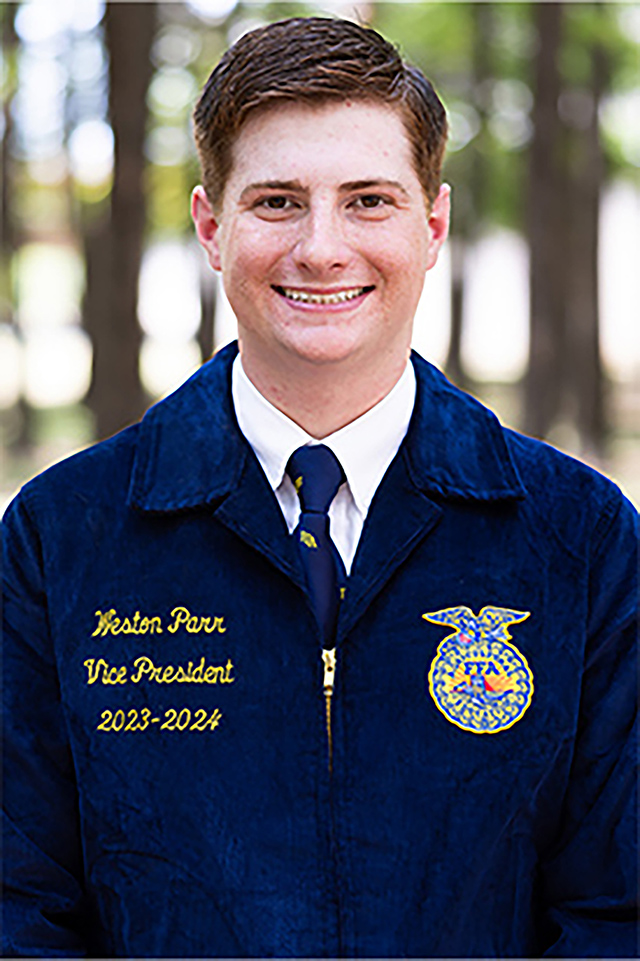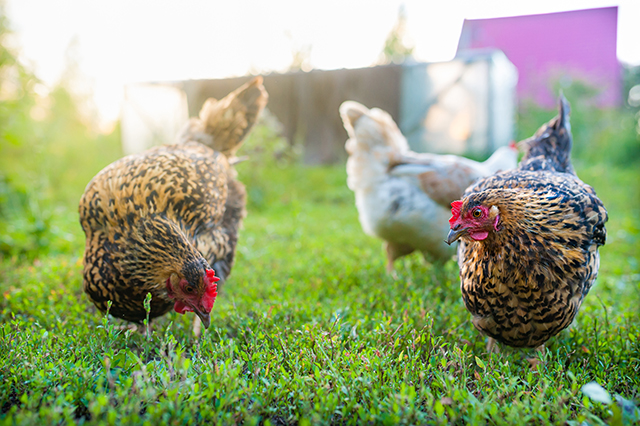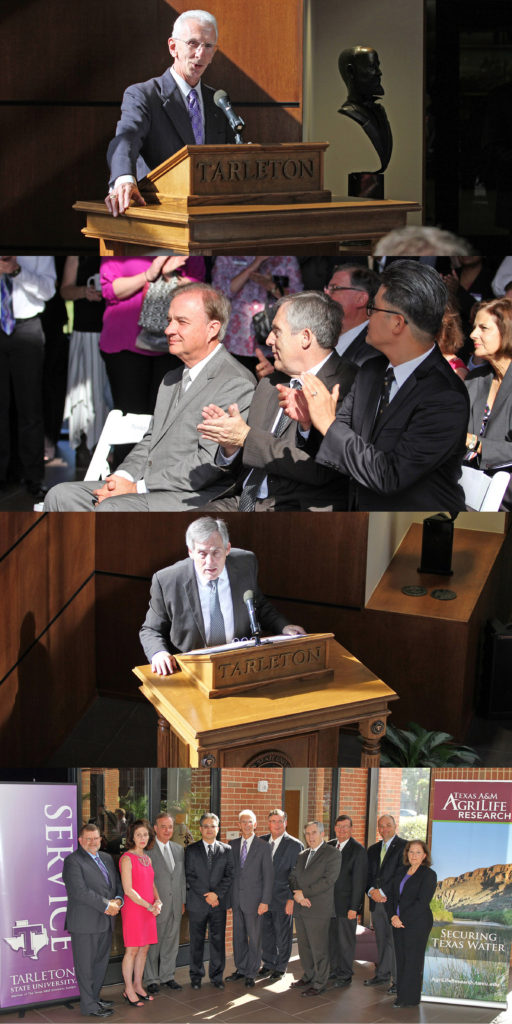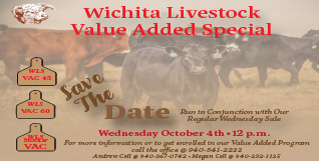Farm & Ranch
Tarleton Receives $997,500 Agricultural Research Grant

FOR IMMEDIATE RELEASE Cecilia Jacobs
Wednesday, October 19, 2016 817-597-6040
Tarleton State University, Texas A&M AgriLife expand bioenergy research
STEPHENVILLE, Texas—Tarleton State University’s Office of Sponsored Projects and Texas A&M AgriLife Research have received an almost $1 million grant to expand their study of bioenergy recovery from animal waste and improve the sustainability of agricultural industries.
The $997,500 grant comes from the Chancellor’s Research Initiative, a fund established by Texas A&M University System Chancellor John Sharp in 2013 to enable the recruitment of star researchers throughout the A&M System.
Dr. Eunsung Kan joins Tarleton’s Southwest Regional Dairy Center as a result of the award, strengthening and expanding collaborative efforts by Tarleton and Texas A&M AgriLife. His research focuses on technologies that recycle dairy manure and wastewater for power generation and other purposes in a way that is environmentally responsible but does not increase operational cost for the dairy farmers.
“The recruitment of Dr. Kan is a great example of why the Chancellor’s Research Initiative is such an important program,” said Chancellor Sharp. “He is an incredible addition to the research efforts at Tarleton and Texas A&M AgriLife, and his research will have tremendous benefits for dairy production in the region and throughout the state.”
Kan previously served as assistant professor in the Department of Molecular Bioscience and Bioengineering at the University of Hawaii at Manoa. He earned his doctorate in chemical and environmental engineering from the University of California at Riverside and conducted postdoctoral research for the U.S. Environmental Protection Agency. He serves as editor of the Open Journal of Water Pollution and Treatment.
“Dr. Kan’s arrival brings our original vision for the Southwest Dairy Center to fruition,” said Tarleton President F. Dominic Dottavio. “We are creating a leading research center for animal waste management and bioenergy recovery that will help develop sustainable food production practices and improve quality of life for Texans and others.”
In addition to leading a team of researchers, Kan will help leverage additional federal, industrial and foundation funding to continue Tarleton and Texas A&M AgriLife’s focus on improving the use of natural resources and reducing environmental concerns associated with water and air quality.
“I am honored to join Tarleton State University and Texas A&M AgriLife in research that is sure to improve the sustainability of agricultural industries and protect our vulnerable environment,” Kan said.
The funds follow a grant awarded to Texas A&M AgriLife Research in 2014 by the USDA Natural Resources Conservation Service to kick start technologies that use animal waste from Tarleton’s dairy center to generate heat and electrical power.
Tarleton State University held a joint press conference with Texas A&M AgriLife Research Wednesday, Oct. 19, to announce a $997,500 grant as part of the Chancellor’s Research Initiative (CRI). Tarleton President F. Dominic Dottavio (top) addresses attendees gathered in the university’s Administration Building; (2nd from top) A&M System Chancellor John Sharp is applauded by Director of Texas A&M AgriLife Research Dr. Craig Nessler and Dr. Eunsung Kan following his CRI announcement; (3rd from top) Dr. Nessler talks about the importance of environmental research that potentially will help dairy producers become more efficient and sustainable in their operations; (bottom photo, l-r) College of Agricultural & Environmental Sciences Dean Dr. Steve Damron, Charlotte Sharp, Chancellor Sharp, Dr. Kan, Dr. Dottavio, A&M System Vice Chancellor for Federal & State Relations Tommy Williams, Dr. Nessler, A&M AgriLife Vice Chancellor Dr. Mark Hussey, College of Graduate Studies Dean Dr. Barry Lambert and Provost Dr. Karen Murray gather following Wednesday’s press conference announcing the Chancellor’s Research Initiative at Tarleton.
# # #
About Tarleton State University
Tarleton, a member of The Texas A&M University System, provides a student-focused, value-driven educational experience marked by academic innovation and exemplary service, and dedicated to transforming students into tomorrow’s professional leaders. With campuses in Stephenville, Fort Worth, Waco, Midlothian and online, Tarleton engages with its communities to provide real-world learning experiences and to address societal needs while maintaining its core values of integrity, leadership, tradition, civility, excellence and service.
About The Texas A&M University System
The Texas A&M University System is one of the largest systems of higher education in the nation, with a budget of $4.2 billion. Through a statewide network of 11 universities and seven state agencies, the Texas A&M System educates more than 140,000 students and makes more than 22 million additional educational contacts through service and outreach programs each year. System-wide, research and development expenditures exceeded $946 million in FY 2015 and helped drive the state’s economy.
About Texas A&M AgriLife Research
Texas A&M AgriLife Research is the state’s premier research agency in agriculture, natural resources and the life sciences. A member of The Texas A&M University System, AgriLife Research conducts hundreds of projects spanning many different scientific disciplines to deliver life-sustaining and industry-changing impacts to residents in Texas and throughout the world.
Contact:
Harry Battson, Assistant Vice President for Marketing & Communications
254-968-1620 (office)
254-431-1760 (cell)
Farm & Ranch
Texas FFA State Vice President Weston Parr

Future Farmers of America was founded by a group of farmers in 1928 with the mission of preparing the next generation of agriculture. It has done just that during its 95-year history, as the organization works to give back to others by following its motto, “learning to do, doing to learn, earning to live, living to serve.”
FFA is an organization made up of state associations, and at the helm of the Texas FFA is a team of 12 officers representing their respective areas within the Lone Star State. These individuals dedicate a year of their lives as they serve members, provide leadership, and work together with the state staff and board of directors to develop policy and lead the organization of over 177,000 members.
North Texas is represented by Area IV and Area IV, stretching from Wilbarger County to Bell County and from Runnels County to Grayson County. This year, those chosen to lead this great area are State President Isaac Hawkins Jr., Area IV, and State Vice President Weston Parr, Area V.
Parr is from the Sam Rayburn FFA chapter and the Area V Association, but the leader who now serves more than 19,100 members of Area V entered the FFA organization as a shy teenager who sat in the back of the room.
“I didn’t talk to a whole lot of people. I didn’t know what I wanted to do with my life or where I could see myself, so I wasn’t involved on my high school campus,” Parr recalled.
“Then I started FFA and slowly but surely, my ag teachers worked me into attending more contests, meeting new people, and speaking. I remember the first time I gave an officer speech to my chapter. I can still remember how embarrassing it was. To see the progression from that moment to speaking on stage at the state convention in front of thousands of people. Now I feel like I can enter the industry I want and be successful all because of what FFA afforded me for five years.”
There is not much Parr did not do during his time in high school. His contest participation included chapter conducting, wool judging, cotton judging, wildlife, and job interview, but his favorite was extemporaneous speaking, which he did not start until his senior year of high school.
“I wish I could go back to my freshman, sophomore, and junior years and start that sooner. I think if I had more time, I would have been more successful than I already was, but that was something I didn’t realize I liked at the time. I’m not naturally somebody who likes to speak in public, but it was actually my favorite,” Parr said.
Parr won several awards during his time competing. In 2023 alone, Parr earned the Texas FFA Service-Learning Proficiency title, was a National FFA Service-Learning Proficiency finalist, and a Texas FFA Extemporaneous Speaking finalist. In addition to his CDE and LDE events during high school, he showed commercial steers at Houston, and boilers at most major shows, participated in the county show with projects in ag mechanics, showed goats from time to time, and showed heifers until graduation.
“FFA provides invaluable resources and knowledge to be successful once you leave high school and you are out of the blue jacket for the first time. I have been a part of a lot of great organizations over the years, and they are all great in their own way, but in my opinion, FFA is the most successful at producing members of society who want to go and do something with themselves,” Parr said.
He was halfway through his time as Area V Association President and attending the national convention when he began to ponder the idea of running for state office.
“This is around the time when you usually figure out if you want to go through and be a state officer or you decide that area officer is your last run. I was unsure of where I wanted to go, but I knew I didn’t want to be done with FFA. I decided maybe it would be a good opportunity not only for me to make more friendships and connections, but also to give back to the program that allowed me to be able to do what I can do today,” Parr explained.
To read more, pick up a copy of the May issue of NTFR magazine. To subscribe by mail, call 940-872-5922.
Farm & Ranch
Texas FFA State President Isaac Hawkins, Jr.

FFA is an organization made up of state associations, and at the helm of the Texas FFA is a team of 12 officers representing their respective areas within the Lone Star State. These individuals dedicate a year of their lives as they serve members, provide leadership, and work together with the state staff and board of directors to develop policy and lead the organization of over 177,000 members.
North Texas is represented by Area IV and Area IV, stretching from Wilbarger County to Bell County and from Runnels County to Grayson County. This year, those chosen to lead this great area are State President Isaac Hawkins Jr., Area IV, and State Vice President Weston Parr, Area V.
These young leaders share a drive to give back to the organization that has given to them as they work to support FFA members while preparing for a future in the agricultural industry.
From the 12 selected representatives, delegates elect a president and first vice president, with the remaining 10 serving as vice presidents from their respective area associations. The selection process consists of a popular vote by delegates at the state convention, which accounts for 40 percent of the decision, and a committee process that includes a written knowledge exam, worth 10 percent, and an interview, accounting for 50 percent. This year, after all was said and done, Hawkins was named this year’s Texas FFA President.
Hawkins grew up as part of a large, blended family with five sisters and three brothers. While he says he did not grow up in agriculture, his youth was spent outside fishing and doing all things outdoors with his father, whom he calls his best friend. As he entered Hirschi High School in Wichita Falls, Hawkins knew he wanted to be a vet but was unsure of what courses to take to set himself on that path.
“I signed up for ag principals just because they had animals in the description. The first day of class we talked about churning butter, and I went to my school counselor that same day and told her to change my schedule immediately, but she refused. She made me stay there,” Hawkins laughed. “Luckily, I had an incredible ag teacher, and she really helped me to fall in love with the program.”
To read more, pick up a copy of the May issue of NTFR magazine. To subscribe by mail, call 940-872-5922.
Farm & Ranch
Hazards of Backyard Poultry

By Barry Whitworth, DVM
Having backyard poultry is a popular agriculture enterprise. According to the United States Department of Agriculture, 0.8 percent of all households in the United States have chickens. People keep chickens for a variety of reasons with table eggs being one of the more common reasons.
Unfortunately, some of these poultry producers are not aware of the hazards that come with keeping poultry because many times they carry pathogens but appear healthy.
Chickens are carriers of several zoonotic diseases. These are diseases that can be passed from animals to humans. According to a recent survey in Pennsylvania, a majority of backyard poultry producers were aware of the dangers of avian influenza. However, this study also revealed that far fewer producers were aware of the risk of possible exposure to Salmonella and Campylobacter.
The lack of knowledge about the hazards of raising poultry likely contributes to the continued issues of Salmonella outbreaks associated with backyard poultry. In 2023, the Centers for Disease Control and Prevention reported 1,072 illnesses of Salmonella linked to backyard poultry, and 272 of those patients required hospitalization. Oklahoma reported 43 individuals with the disease.
To read more, pick up a copy of the April issue of NTFR magazine. To subscribe by mail, call 940-872-5922.
-

 Country Lifestyles1 year ago
Country Lifestyles1 year agoScott & Stacey Schumacher: A Growth Mindset
-

 Equine7 months ago
Equine7 months agoThe Will to Win
-

 Country Lifestyles7 years ago
Country Lifestyles7 years agoStyle Your Profile – What your style cowboy hat says about you and new trends in 2017
-

 Country Lifestyles4 years ago
Country Lifestyles4 years agoAmber Crawford, Breakaway Roper
-

 HOME7 years ago
HOME7 years agoGrazing North Texas – Wilman Lovegrass
-

 Country Lifestyles7 years ago
Country Lifestyles7 years agoDecember 2016 Profile, Rusty Riddle – The Riddle Way
-

 Country Lifestyles8 years ago
Country Lifestyles8 years agoJune 2016 Profile – The man behind the mic: Bob Tallman
-

 Outdoor9 years ago
Outdoor9 years agoButtercup or Primrose?







